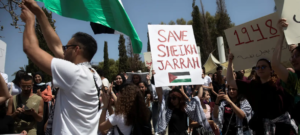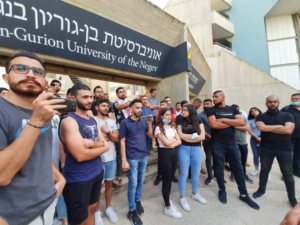Facing attacks and incitement, Arab students flee Israeli campuses

Arab students of Tel Aviv University protesting on campus against violence in East Jerusalem, May 2021
Hagar Shezaf and Yanal Jbareen report in Haaretz on 20 May 2021:
The unrest between Arabs and Jews all over Israel last week and the cross-border violence between Gaza and Israel have seeped onto university campuses throughout the country and aroused deep fears among Arab students. Students told Haaretz they are facing violence and incitement from their fellow students, as well as police violence.
Two weeks ago, dozens of Arab students from Ben-Gurion University of the Negev took a private bus to their families in the north. They were afraid to stay in Be’er Sheva after right-wing activists threw stones at them, forcing to hide in the dorms.
“After I saw extremist Jews wandering around the dorms alongside police, I decided I was returning to the north, to my parents,” said Ahlam, a medical student. “I also asked the hospital where I work to let me not come in, out of fear. I feel unsafe.”
The day before, Arab students at the university organized a solidarity demonstration with the Palestinians in Jerusalem, in from of the campus. The protest focused on the evictions in Jerusalem’s Sheikh Jarrah neighborhood and the clashes with police at Al-Aqsa Mosque. The protest organizers sought a police permit in advance. Half an hour after the protest began, far-right activists began a counter-demonstration across from them, they said.
“They threw stones at us, called us supporters of terrorism and shouted ‘Death to Arabs,’” said an Arab economics student who participated in the protest and who asked to remain anonymous. In a video clip from the event, a right-wing demonstrator can be heard saying, “Don’t touch the police, just the Arabs.” The students recognized some of the demonstrators as their classmates or Be’er Sheva business owners. One of the Arab students was detained by the police, handcuffed and taken inside the campus. The university said he was taken inside for his own protection.
As a result, the Arab protesters decided to disperse and left together. They headed for the dorms in the Dalet neighborhood next to the campus, but the security guards there prevented them from entering, and one of the guards even reached for the gun in his holster, they said. The university said that “violent groups” surrounded the guard and touched his pistol, and he may have prevented further violence. At this stage, the group dispersed and about 30 of the students returned to their homes in the dorms in the Gimel neighborhood.
At the same time, an announcement went out in a WhatsApp group of right-wing activists named “Returning security to the city,” calling to attack Arabs. Another announcement called for group members to go “only to the Gimel dorms, where all the students who were at the protest are.” Some 100 people showed up at the Gimel neighborhood dorms in response, Arab protest organizers estimated. They called the police, they said, but officers responding arrested six Arab students instead. In a video from the scene, a policeman can be seen hitting a student in the face while arresting him; protest organizers say that student had not participated in the protest and was on his way to the train station at the time. The arrests took place outside the dorm complex; students said the space is part of the university, while the university responded it is not responsible for the area.
After the dorm incident, faculty members held an emergency online meeting under the auspices of a group named “Campus against Racism.” Some 500 Arab students participated. Several faculty members from the group attended the remand hearing for arrested Arab students. The faculty group sent a letter to the university administration criticizing campus guards, and demanding the administration condemn the incitement and the attacks on Arab students.
“The students’ testimony exposes the failure of security staff to guarantee basic safety for our students,” wrote the faculty members. They demanded the administration investigate the events, publish a condemnation and fire any security guards found to have behaved inappropriately.
The police said several Jewish and Arab suspects were arrested for disorderly conduct and assaulting police officers. Twelve of them are still detained – eight Jews and four Arabs. One, an Arab student, will be charged for assaulting police officers, resisting arrest and participating in a brawl, police said. The court extended his remand twice last week. His lawyer said he did not assault a police officer or resist arrest. Other students told Haaretz the same thing.

Arab students protesting at Ben-Gurion University of the Negev, May 2021
Afraid to go shopping
Arab students at Tel Aviv University also said they are afraid to stay in Tel Aviv or to return to their families in the north via public transportation. They commissioned private transport to get home. A 24-year-old female student who stayed told Haaretz that she was attacked last Tuesday when she returned to the dorms after a demonstration at the university entrance. She said four young people got out of a car, cursed her, pointed at her head covering, asked if she was a Hamas member – and poured coffee on her.
“It was very scary, and since then it has become even scarier and more tense,” she said. “I work in Rehovot and am afraid to commute by train.” Sami, a student at the Israel Academic College in Ramat Gan, was riding his motorbike alongside friends Wednesday night a week ago. “Suddenly a car came and blocked us,” he said. “Four or five people got out of there, with a knife and iron pipe. They began to hit me and another friend who didn’t manage to run away. Two other friends fled.”
Sami was stabbed twice in his leg, and his friend was hit in the head. The two were treated at Sheba Medical Center, Tel Hashomer. The attackers didn’t cover their faces, said Sami. The attackers had heard them speaking in Arabic earlier, he said. After he and his friend filed a complaint with the police, the two left the city and returned to their families in the north.
“There is terrible fear,” said Tarek Yassin, the chairman of Hadash’s national student union and a student at the Open University. “Arab students are organizing emergency groups on WhatsApp. People are afraid to even go shopping. Everyone knows the police won’t be there if they need them,” he said. An Arab student at the Technion – Israel Institute of Technology sent Yassin a screenshot of a Facebook message sent to him by another student, stating, “You are all going to die,” and “smelly dogs.”
The Arab student complained to the Technion, and was at first told that the university would not intervene in off-campus speech. The dean of students later e-mailed him, stating that he had contacted the student who sent the message, who responded that his Facebook account had been hacked. The Hadash students organization has opened an aid hotline for Arab students.
Prof. Mona Khoury-Kassabri, the dean of the school of social work and the adviser to the president on making higher education accessible to the Arab community at the Hebrew University of Jerusalem, said that following student requests, the university excused students from attending mandatory attendance labs. Students were also told where to turn for help.
The confrontations on Monday, May 10 between Palestinian youth from North Jerusalem’s Isawiyah neighborhood and police at the entrance to Hebrew University’s Mount Scopus campus left their mark on Arab students. “We were at the end of a fast day, leaving the campus, and it was scary,” said a female student. “The police dispersed with violence and arrested the Arab youths.” When rides were organized for students from the city back home to their families in the north, she rushed to sign up. She was afraid she would be at risk in the city due to her head covering.
“I don’t know when I’ll come back to Jerusalem. I just know that I will return with very hard feelings,” she said.
Responses
Ben-Gurion university said: “The incident described occurred outside the university and the dorms. We regret the incident deteriorated into violence, due to people who are not part of the university community, on both sides.” A review of guards’ conduct did not find any suspicion of misdeeds. “The security staff of the university acted, while putting themselves at risk, to protect the students by bringing them into the dormitory compound. Everyone who identified as a student was let in, and non-students were prevented from entering,” said the university.
As for the student arrested at the protest, he was brought onto campus by security staff for his own protection. The police later instructed he be released. ”The university has acted tirelessly to preserve students’ safety and sense of security. We are now in difficult times in all of Israel, but there is zero tolerance for violence, from any side, while we allow for opinions to be exchanged openly and safely.” The university said it will hold activities to help heal the rifts.
Tel Aviv University said it has made great effort all year round to guarantee the wellbeing of all those on campus, including dorm residents. “In addition to the regular security at the gates, the university has a command and control center manned 24/7 and a staff who patrol and provide an immediate response in every case that requires intervention. Because of the security escalation, the university’s security staff has been instructed to ramp up its shifts and patrols on campus and to handle every exceptional incident with resolve. Security arrangements in the dormitories have been reinforced as well.”
The Technion said: “The case mentioned was examined in depth and it seems the Facebook account of the student who sent the inciteful messages was hacked. Because the Technion does not have the tools or investigative authority, the student who complained was told to turn to the police. The Technion harshly condemns any violent or offensive speech and demands students show moderation and restraint in these difficult times, in Technion social media message platforms and e-mail.”
This article is reproduced in its entirety
